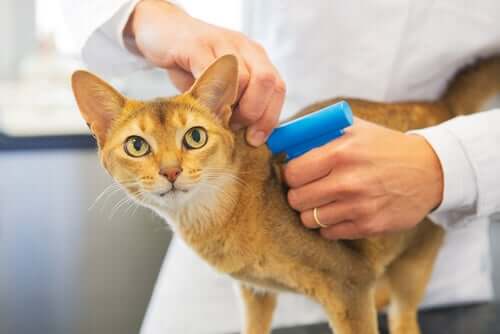What You Need to Know About Microchips

When a pet gets lost or someone steals them, the owners (and the animals) suffer. In order to find them more easily, a vet can implant a microchip in your pet’s skin. This essentially works as an electronic animal ID card. In this article, we’ll tell you what you need to know about microchips.
What you need to know about microchips

A microchip has the ability to track an animal wherever it goes. It’s as small as a grain of rice and a vet places it between the animal’s shoulder blades. It contains a unique identification number which the vet enters into an international database. The microchip lasts for 25 years, meaning it’s good for the dog’s entire life.
Once the vet implants this animal ID card into your pet, the number can be found using a special hand scanner. Many shelters, vets, and public agencies have this device. It allows you to read the ID number and contact the owners to try to get the pet back to its home.
While many owners don’t like the idea of putting something into their pet’s body, microchips are very safe. It is made of a biocompatible substance that doesn’t degenerate or change over time. Once a vet injects the microchip, it doesn’t move or cause any allergic reactions in the animal.
Unlike an ID tag on a collar, you can’t easily remove a microchip. However, we do recommend that your dog has both. Anyone can see a collar, while a microchip can only be read by those who have a special scanner.
The microchip is an undeniable and irrefutable proof of ownership. Even if someone steals and tries to sell the animal, a prospective buyer could demand the data from the microchip before purchasing the animal.
Why put a microchip in your dog or cat?
It’s not at all expensive to get a microchip for your pet. In some cases, you may have to pay an annual fee for the service. Even if you live in an apartment or your pet doesn’t go outside without your supervision, you should still consider a microchip. Accidents can happen in the blink of an eye.
There are many cases where dogs or cats run away because they get frightened and then the owners can’t find them. You, or someone you live with, might also leave the door open and the animal could go outside without anyone noticing. There are countless examples of these kinds of accidents happening.
A person, or even the animal, can easily remove a normal collar (if it gets caught in a fence, for example). In some cities where natural disasters are common (earthquakes, hurricanes, tornadoes, etc.), most people decide to get a microchip for their animals. In the middle of an emergency, your pet can easily get scared, run away, and get disorientated.
Among the main reasons you need to know about microchips for your dog or cat, consider:
Greater possibility of return if lost

With a microchip, agencies can reunite a lost pet with his family in a matter of hours. This is ideal for when you are going on vacation, for example, or in any case where an animal accidentally gets out. It’s much safer than a collar with a tag.
Lower risk being able to sell animals illegally
If someone steals an animal because of its breed and tries to sell it, many buyers review the microchip before purchasing the animal as a precaution. That way they know who the owner is and can verify that the seller is the legitimate owner.
It’s a painless procedure
A vet can implant this microchip just like an injection or a vaccine. It just takes a few minutes and then once installed, it doesn’t generate any complications in their daily lives. It’s impossible to remove a microchip from the animal once implanted, so it’s a 100% effective system.